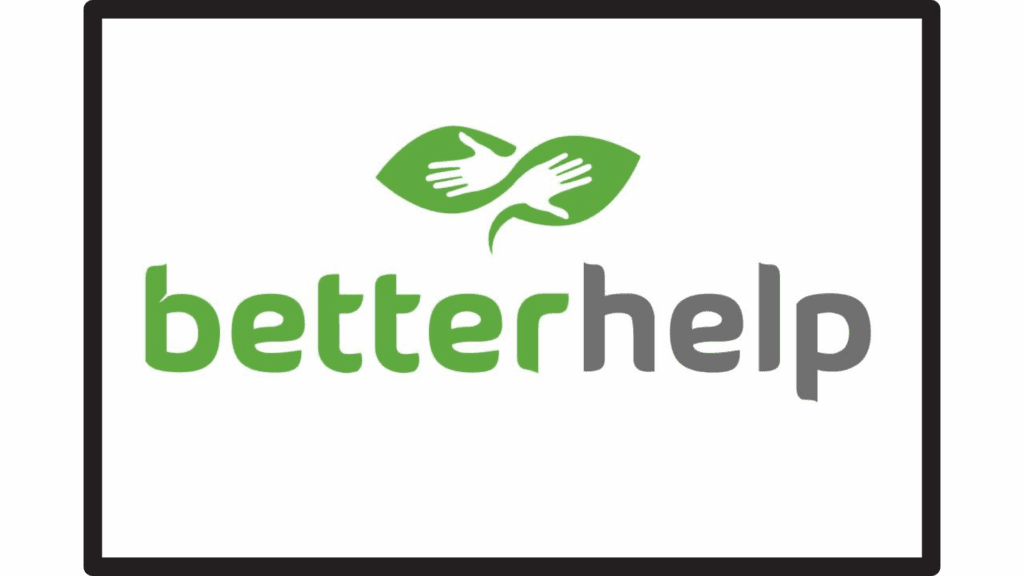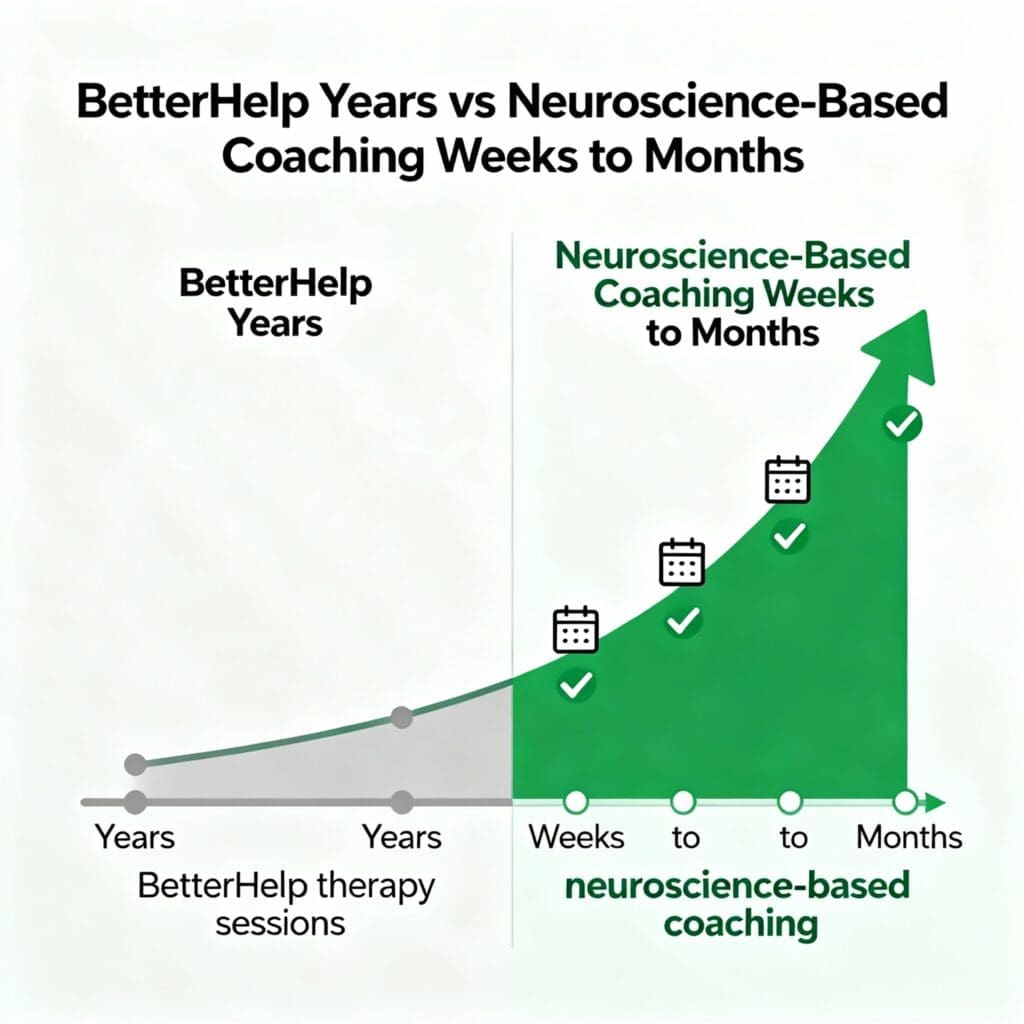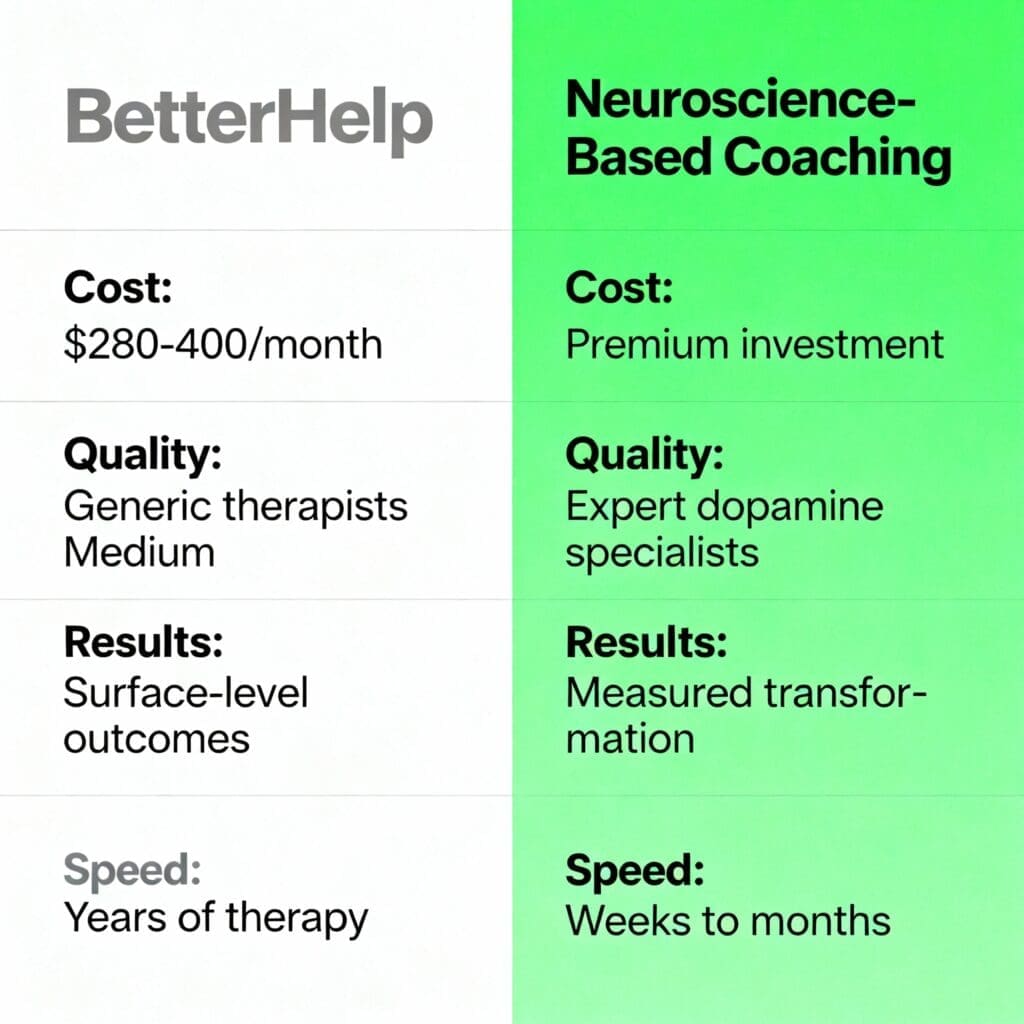The Real Problem With Cheap Mental Health Solutions
You’ve probably seen the ads. BetterHelp pops up everywhere, promising affordable therapy from the comfort of your home. On the surface, it sounds perfect. But if you’re serious about real change, you need to understand what you’re actually getting. Let me be direct: when it comes to your mental health and personal growth, you absolutely get what you pay for.
I’m Dr. Sydney Ceruto, founder of MindLAB Neuroscience-Based Coaching. Over 25 years, I’ve watched thousands of clients transform their lives, not through quick fixes or generic online conversations, but through brain-based coaching grounded in hard neuroscience. My journey started with personal pain. As a teenager, I lost both parents. I became deeply depressed and suffered from chronic anxiety. That loss pushed me to study the mind-brain connection at Yale and later earn three master’s degrees in psychology and two PhDs in cognitive and behavioral neuroscience from NYU. What I learned changed everything, and it’s why I built my practice differently from platforms like BetterHelp.
This personal struggle forced me to ask hard questions about mental health support and why no one had ever thought about Neuroscience-Based Coaching. Why do so many people invest in cheap online therapy and see minimal results? Why do they bounce between therapists, feeling like their story doesn’t matter? Why does surface-level support feel empty when you’re desperate for real change? The answer isn’t that these people aren’t trying hard enough; it’s that the system they’re using was never designed for their transformation. I realized that affordable doesn’t have to mean ineffective, but it also shouldn’t mean you sacrifice quality, expertise, and genuine care. That realization became the foundation of my entire practice philosophy.

- Unlock Neuroplasticity In 10 Steps: A Guide To Brain Mastery
- Understanding Neuroscience Of Anxiety: Remarkable Insights Into Our Brain
- Dopamine Depletion: The Hidden Epidemic in Brain H
What Is BetterHelp and How Does It Work?
BetterHelp is an online therapy aggregator. It connects you with licensed therapists via text, phone, and video. The model is simple: you pay a subscription fee (typically $280-400 monthly), get matched with a therapist, and start talking. The platform claims to offer affordable, accessible mental health support. And for people with zero access to therapy, it’s better than nothing.
The company was founded in 2013 with a mission to make mental health support more accessible. BetterHelp has grown to serve over 5 million users and employ more than 34,000 licensed therapists. On paper, it sounds incredible. But the reality behind those numbers tells a different story about quality and transformation.
But here’s the reality: BetterHelp isn’t designed for transformation. It’s designed for scale. With over 34,000 therapists and millions of users, the company prioritizes volume over depth. The business model depends on moving as many clients through the system as possible, not on creating deep, lasting change for individual people.
Therapists on the platform earn between $30 and $70 per session, compared to $100 and $200 per hour in private practice. Think about what that means. Lower pay equals therapist burnout. Therapist burnout equals rushed sessions, minimal personalization, and therapists managing excessive caseloads just to make decent money. You might be one of fifty clients your BetterHelp therapist is juggling.
If a BetterHelp therapist earns $50 per session and needs to make a living, they have to see as many clients as possible. This creates a system in which depth and personalization are luxuries the business model cannot support. The therapist isn’t thinking about your unique challenges between sessions. They’re thinking about how many more clients they need to see this week to pay their bills. This isn’t a criticism of the therapists. It’s a structural problem built into the platform’s economics.
When you compare this system to neuroscience-based coaching, the contrast becomes clear. A neuroscience-based coaching practice works with a limited number of clients so that each person gets genuine depth and personalization. The coach has time between sessions to think about your case and prepare targeted interventions. This difference in model creates vastly different outcomes.
The platform also markets itself aggressively through social media, podcasts, and celebrity endorsements. What you don’t hear about is the FTC settlement for privacy violations or the consistent complaints about quality and therapist switching. The marketing machine is powerful, but it’s selling a product that often doesn’t deliver what it promises.
- Achieve Success Through Neuroscience Based Mindset Coaching
- Positive Thinking Through The Lens Of Neuroscience
- Data-Driven Coaching: A New Way To Revolutionize Your Growth
The Quality Gap: What You Actually Get with BetterHelp
The numbers tell the story. In recent user surveys, 70% of BetterHelp users reported negative experiences. Eighty percent of people who tried multiple therapists had negative outcomes. And 30% said BetterHelp actually made them view therapy as ineffective. Users describe sessions as rushed, surface-level, disengaged, and unhelpful. Therapists are late to appointments, take weeks to respond despite promises of “message anytime” support, and switch out unexpectedly, forcing clients to restart their entire story with someone new.
Many clients report feeling invisible on the platform. They pay their monthly fee and still struggle to get consistent support. Some describe waiting days or weeks for responses to critical messages, even during mental health crises. Others have been matched with therapists who specialize in completely different issues than what they’re struggling with. And because the platform operates on an algorithm-driven matching system, you have limited ability to select a therapist who actually fits your needs. You’re assigned to whoever is available, whether they’re a good match or not.
Clients also report that therapists often seem unprepared during sessions. They haven’t reviewed notes from previous conversations. They ask questions that were answered weeks ago. They seem to be seeing you for the first time, even though this is your fifth session together. This isn’t because the therapists don’t care. It’s because they’re juggling so many clients that preparation time is a luxury they simply don’t have. The result is sessions that feel transactional rather than therapeutic, like you’re a problem to solve rather than a person to understand.
This isn’t a bug in the BetterHelp model. It’s the model itself. When therapists are compensated so poorly, they can’t afford to invest deeply in client progress. They’re managing survival, not transformation. In my practice, my clients work with me consistently. I know their history, their patterns, their unique neurobiology. I can spot what’s blocking them and address it at the root. With BetterHelp, you’re often explaining your situation repeatedly to people who barely know you.
Contrast this experience with neuroscience-based coaching, where continuity and preparation are non-negotiable. I review your case before every session. I prepare interventions specifically tailored to your brain’s needs. I’m thinking about your progress between sessions and adjusting my approach based on what’s working. You’re not one of fifty clients. You’re someone I’m genuinely invested in helping transform.
- Underappreciated At Work? Proven Ways To Boost Confidence
- Neuroscience Of Trusting Your Decisions: Clarity & Confidence
- Understanding Neuroscience Of Anxiety: Remarkable Insights
Privacy Concerns: Your Data Matters
Here’s something most people don’t know. In 2023, the Federal Trade Commission fined BetterHelp $7.8 million for sharing sensitive health data with Facebook, Snapchat, and other advertisers without proper consent. For years, the platform shared encrypted user information, including mental health questionnaire responses, email addresses, and IP addresses, for targeted advertising purposes. This happened despite explicit privacy promises. When you’re vulnerable and seeking help, the last thing you need is your mental health profile being sold to data brokers for profit.
In my practice, your information stays private. Period. That’s the standard for ethical, professional coaching. But on aggregator platforms, you’re a data point in a system designed to monetize attention. Your vulnerability becomes a marketing asset.

Neuroscience-Based Coaching: The Different Approach
I founded MindLAB Neuroscience on a completely different principle. Instead of matching generic therapists with clients at scale, I created a concierge model centered on neuroscience, neuroplasticity, and personalized transformation. This isn’t just another therapy platform dressed up with technology and algorithms. This is a commitment to doing the opposite of what BetterHelp does at every level. My entire practice is structured around one singular goal: your genuine, measurable transformation.
Here’s what makes it different. First, expertise. I’m not just a therapist, I have deep neuroscience credentials. My two PhDs in cognitive and behavioral neuroscience mean I understand how your brain actually works at the molecular and systems level. I can identify the specific neural patterns causing your struggle and rebuild them using brain-science principles. This isn’t self-help psychology. It’s applied neuroscience.
When I work with you, I’m not relying on generic therapeutic techniques that might work for some people and completely miss the mark for others. I’m using cutting-edge neuroscience to understand why you’re stuck, what’s driving your patterns, and exactly how to rewire them. This is the difference between hoping therapy helps and knowing that targeted brain-based intervention will create change. Your transformation isn’t left to chance. It’s engineered.
Second, continuity. You work with me directly. I’m not assigning you to whoever has an opening. I’m building a real relationship with you, understanding your unique neurobiology, and designing a personalized approach. My clients don’t restart their story every session. We build on each conversation, going deeper and creating measurable transformation. Between sessions, I’m thinking about your case and preparing specifically tailored interventions designed for your brain.
Third, specialization. My work focuses on dopamine optimization, neuroplasticity, and rewiring limiting patterns that no longer serve you. I’ve spent over two decades studying how the brain learns, motivates, and adapts. I apply that knowledge to your specific situation, whether you’re struggling with motivation, anxiety, career decisions, relationship challenges, or self-esteem. This targeted, brain-based approach creates results that generic therapy doesn’t achieve.
What makes this specialization powerful is that dopamine isn’t just about happiness. It’s the system that drives motivation, focus, persistence, and your ability to pursue meaningful goals. When dopamine is dysregulated, everything in your life suffers. But when you work with someone who understands dopamine at the neurochemical level and knows exactly how to optimize it, you don’t just feel better. You become unstoppable. That’s what neuroscience-based coaching at this level delivers.
- Unlock Neuroplasticity In 10 Steps: A Guide To Brain Mastery
- Mindfulness And Neuroplasticity: Powerful Brain Rewiring 2025
- Leadership Presence: Conquer The Neuroscience Today
Real Results: Success Stories That Matter
My clients transform. Not someday. Now. One client, a Chief Operations Executive at a multinational tech company, came to me struggling with emotional leadership. Within months of brain-based coaching, she completely transformed her leadership style. Her team went from disconnected to deeply engaged. Trust and respect were rebuilt. She told me it was essential for any leader seeking genuine growth.
Another client, a brand executive who felt lost in her career, came to me on the edge of burnout. Through neuroscience-based coaching, I helped her rewire the thought patterns driving her overwhelm. She gained mental clarity, rebuilt confidence, and positioned herself for advancement. She now describes the work as life-changing.
These aren’t therapy success stories where someone feels slightly better after years on a therapist’s couch. These are transformation stories. Real people making real changes in real time. Why? Because we’re working with your brain’s actual design, not just talking about your problems.
The Recognition Behind the Expertise
I don’t just claim expertise, I’ve earned it. In 2022, I received the CREA Award for innovation in neuroscience-based coaching. I’m inducted into the International Society for Female Professionals. I’m a senior writer for the Forbes Executive Coaching Council and executive writer for Alternatives Watch and Brainz Magazine. I’m a Senior Member of the Positive Coaching Alliance. I’m a frequent speaker at the Wharton School of Business. I’m a lead researcher at NYU Steinhardt. These aren’t random credentials. They represent decades of work, peer recognition, and commitment to advancing the field.
When you work with me, you’re not getting a generalist who studied psychology in grad school. You’re getting someone who has dedicated their life to understanding how neuroscience drives change. Someone who leads institutions and organizations is recognized as an expert in the field. Someone who walks the walk.

The Concierge Difference: You’re Not a Number
With BetterHelp, you’re one of millions. You get matched with whoever is available. If that therapist isn’t working, you switch and restart. If you need flexibility, you hope the system accommodates it. It’s impersonal by design.
My model is different. I work with a limited number of clients so I can give each person genuine attention. You have direct access to me. When you text me, I respond. When you need real-time guidance, I’m available. When life happens between sessions and you need advice, you get it from someone who knows you deeply, not a stranger assigned by an algorithm. This concierge approach costs more than a BetterHelp subscription, because it’s actually worth more.

Dopamine Science: Why Neuroscience-Based Coaching Works
Let me explain the neuroscience. Your brain’s dopamine system drives motivation, focus, reward, and goal-pursuit. This isn’t a minor brain chemical. Dopamine is THE system that determines whether you pursue your goals or quit halfway through. When dopamine is dysregulated, everything suffers. Your drive collapses. Your emotional stability cracks. Your ability to sustain effort toward meaningful goals disappears. You might have brilliant ideas and genuine desire for change, but without healthy dopamine regulation, you’re stuck spinning your wheels. Traditional therapy rarely addresses this system directly. You talk about your problems, maybe develop some coping strategies, and hope that talking helps. It often doesn’t, because you’re treating symptoms while ignoring the brain system actually driving them.
Dopamine operates on several levels. There’s the reward dopamine that makes accomplishment feel good. There’s the motivation dopamine that makes you want to pursue a goal in the first place. There’s the focus dopamine that lets you concentrate on what matters. And there’s the memory dopamine that helps your brain learn from experience and adapt. When these systems work together properly, you’re unstoppable. You pursue goals, overcome obstacles, learn from failure, and keep moving forward. But when even one of these dopamine subsystems is dysregulated, your entire life suffers.
I’ve spent over two decades researching dopamine and how to optimize it for real transformation. My research forms the foundation of my neuroscience-based coaching practice and is the core of my recently published book, “The Dopamine Code,” published by Simon and Schuster. In this book, I reveal exactly how dopamine shapes your motivation, your choices, your relationships, and your ability to create lasting change. If you want to understand the science behind why people succeed or fail in their transformation efforts, this book breaks it down in practical, actionable terms.
You can explore the research and insights in “The Dopamine Code” here: https://www.simonandschuster.com/books/The-Dopamine-Code/Sydney-Ceruto/9781507226117
Neuroscience-based coaching works differently from traditional therapy because it works directly with dopamine. I assess your dopamine system comprehensively. I don’t just listen to your story. I identify which specific dopamine subsystems are dysregulated and why. Is your motivation system blocked? Is your reward system broken? Is your focus system fragmented? Once I identify what’s happening at the neurochemical level, I use specific brain-based interventions to restore optimal dopamine regulation. This creates real, measurable changes. Clients experience restored motivation within weeks. They gain improved focus and mental clarity. They develop better emotional regulation. They make sustained progress toward goals that previously felt impossible. Why? Because we’re not just talking about problems. We’re addressing the actual brain system driving the problem.
This is why neuroscience-based coaching creates results so much faster than traditional therapy or online platforms like BetterHelp. We’re not managing symptoms. We’re optimizing the fundamental brain system that creates motivation, persistence, and the ability to achieve meaningful goals. When your dopamine system is optimized, everything changes.
- Dopamine Coaching Neuroscience: Unlock Motivation & Focus
- The Dopamine Paradox: Wanting vs. Liking Explained
- NeuroDrive: Personalized Dopamine Optimization
Transformation Happens Faster
This is crucial. With my approach, clients see meaningful change within weeks and months, not years. One client transformed from a struggling mid-level manager facing job loss to a commendable performer within months. Using neuroscience-based tools and direct access to personalized advice, she overcame procrastination, reorganized her thinking, and mastered task prioritization. Her career was literally saved because the intervention was effective and fast.
That’s the difference between surface-level therapy and brain-based coaching. We’re not just managing symptoms. We’re rewiring the neural patterns driving them.

You Get What You Pay For: The Real Cost Analysis
BetterHelp costs $280-400 monthly. For that price, you get limited therapist time, surface-level conversations, and no guarantee of meaningful change. You might feel slightly better after venting, but lasting transformation? That’s rare.
Neuroscience-based coaching costs more. But here’s what you actually get. You get expertise that took decades to develop. You get personalized attention designed specifically for your neurobiology. You get a concierge model with direct access. You get proven results in a timeframe that matters. You get transformation, not just conversation. For serious, lasting change, that’s not expensive. That’s an investment in yourself with measurable returns.
Think about it this way. Years of surface-level therapy at low cost versus months of targeted, brain-based coaching at higher cost. Which actually serves you? Which actually changes your life? You get what you pay for, whether that’s generic support from an overtaxed therapist or personalized transformation from a dedicated expert.
When BetterHelp Might Be Appropriate
I’m not here to bash BetterHelp entirely. If you’re completely new to therapy and want to explore it affordably, BetterHelp is a good place to start. If you have no other access to mental health support, it’s better than nothing. If you have specific, short-term challenges, it might help. But if you’re serious about real transformation, if you want to rewire limiting patterns, optimize your brain’s potential, and create lasting change, BetterHelp won’t get you there.
Making the Investment in Quality
Real transformation requires real investment. Not just money, but your commitment. When you work with neuroscience-based coaching, you’re committing to actual change. It’s harder than venting to a distant therapist. It’s also exponentially more effective.
Think about what you’re really paying for when you choose the cheaper route. You’re paying for surface-level conversations with overwhelmed therapists who don’t have time to care about your progress. You’re paying for disappointment and the slow erosion of hope that real change is possible. These costs aren’t measured in dollars, but they’re devastating to your life.
Now think about what you’re investing in with neuroscience-based coaching. You’re investing in 25 years of expertise and multiple advanced degrees in understanding transformation. You’re investing in continuity, in a coach who knows you deeply and cares about your outcome. Most importantly, you’re investing in yourself. You’re saying to your brain and your future: “I’m worth the investment.”
Your mental health, your emotional stability, your ability to pursue meaningful goals—these are worth more than the discount price of an aggregator platform. Consider the real cost of staying stuck. How many years have you spent in frustration? How many goals have you postponed? The cost of waiting is far greater than the investment in quality neuroscience-based coaching.
When my clients invest in this work, they regret that they didn’t do it sooner. They tell me constantly it was the best decision they ever made. One executive client’s investment paid for itself within months through increased productivity alone. You can’t build a premium life on a discount budget. You can’t create exceptional results from generic support.
The investment you make today in quality neuroscience-based coaching isn’t just solving today’s problems. It’s building the foundation for a completely different future. It’s rewiring your brain to operate at its full potential. That’s the best investment you can make in yourself.
- Dynamic Dopamine-Aware Leadership
- Success-Focused Mindset: Unlock Powerful Potential In 6 Steps
- Astonishing Ways The Brain Drives Motivation
The Bottom Line
BetterHelp represents a trend in mental health: make it cheap, make it accessible, make it scalable. But transformation doesn’t scale. Real change requires real expertise, real attention, and real commitment to each person’s unique journey. That’s what neuroscience-based coaching delivers. That’s what 25 years of dedicated practice and multiple advanced degrees make possible. That’s what you get when you choose quality over convenience.
You absolutely get what you pay for in mental health support. The question is simple: what are you willing to invest in yourself? Are you looking for a quick, inexpensive conversation, or are you ready for genuine, brain-based transformation that actually works?
If you’re ready to experience what real neuroscience-based coaching can do, let’s talk. I offer consultations for people serious about change. Let’s explore whether we’re the right fit for your transformation.
- Exhibiting Leadership Resilience With Neuroscience Insights
- The Neuroscience of Relationships
- 7 Powerful 80/20 Rule Applications For Life Transformation
#NeuroscienceCoaching #BetterHelpAlternatives #BrainBasedCoaching #DopamineCoaching #OnlineTherapyComparison #NeuroscienceBasedTherapy #PrivateCoaching #MentalHealthCoaching #PersonalizedCoaching #Neuroplasticity #ExecutiveCoaching #ProfessionalDevelopment #TransformationalCoaching













